#józef zajączek
Text
Polish names are so silly.
You'll have a guy that looks like this:
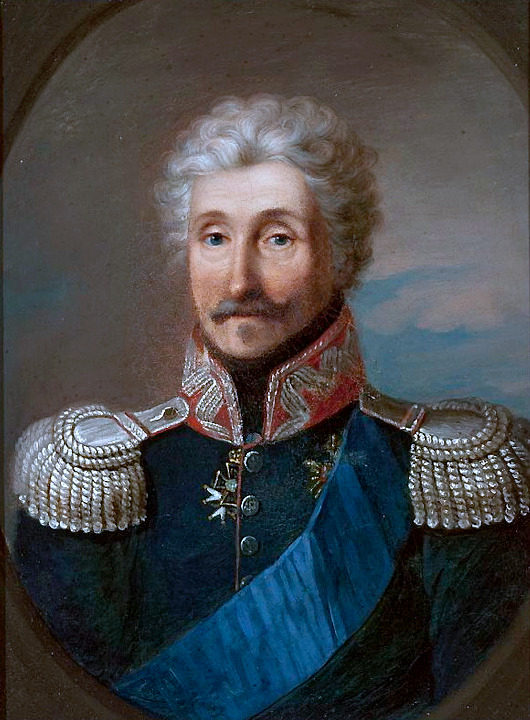
And his name is literally General Little-Bunny-Rabbit.
44 notes
·
View notes
Text
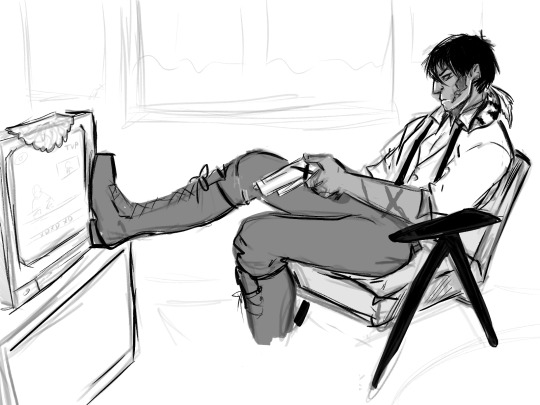

part 3 of putting them in eastern europe - scrapped sketches edition because they are all a lil wonky and i dont know how to fix them
[ps not to be a Design Nerd on main but the chair in the first drawing is the Zajączek ("Bunny") / Type 366 armchair designed by Józef Chierowski. designed roughly around the late 1950s, it ended up as one of the furniture pieces that actually got exported outside of communist poland]
#khr#art#khr xanxus#khr squalo#katekyo hitman reborn#home tutor reborn#scheudled post#superbi squalo#superbia squalo
77 notes
·
View notes
Text
The updated list of nominees so far:
France:
Jean Lannes
Josephine de Beauharnais
Thérésa Tallien
Jean-Andoche Junot
Joseph Fouché
Charles Maurice de Talleyrand
Joachim Murat
Michel Ney
Jean-Baptiste Bernadotte (Charles XIV of Sweden)
Louis-Francois Lejeune
Pierre Jacques Étienne Cambrinne
Napoleon I
Marshal Louis-Gabriel Suchet
Jacques de Trobriand
Jean de dieu soult.
François-Étienne-Christophe Kellermann
Louis Davout
Pauline Bonaparte, Duchess of Guastalla
Eugène de Beauharnais
Jean-Baptiste Bessières
Antoine-Jean Gros
Jérôme Bonaparte
Andre Masséna
England:
Richard Sharpe (The Sharpe Series)
Tom Pullings (Master and Commander)
Arthur Wellesley, 1st Duke of Wellington
Jonathan Strange (Jonathan Strange & Mr. Norrell)
Captain Jack Aubrey (Aubrey/Maturin books)
Horatio Hornblower (the Hornblower Books)
William Laurence (The Temeraire Series)
Austria:
Klemens von Metternich
Friedrich Bianchi, Duke of Casalanza
Franz I/II
Archduke Karl
Marie Louise
Poland:
Wincenty Krasiński
Józef Antoni Poniatowski
Józef Zajączek
Maria Walewska
Russia:
Alexander I Pavlovich
Alexander Andreevich Durov
Prince Andrei (War and Peace)
Pyotr Bagration
Mikhail Miloradovich
Levin August von Bennigsen
Prussia:
Louise von Mecklenburg-Strelitz
Gebard von Blücher
Carl von Clausewitz
Frederick William III
Gerhard von Scharnhorst
Louis Ferdinand of Prussia
Friederike of Mecklenburg-Strelitz
The Netherlands:
Ida St Elme
Wiliam, Prince of Orange
The Papal States:
Pius VII
#napoleonic sexyman tournament#there is something mildly funny about the English being overwhelmingly fictional Englishmen#and Wellington
54 notes
·
View notes
Text
Józef Poniatowski and Berezina’s crossing
On occasion of the anniversary of the battle of Berezina, which happened 210 years ago, let me tell you a little bit on the topic what was happening with prince Józef at that time.
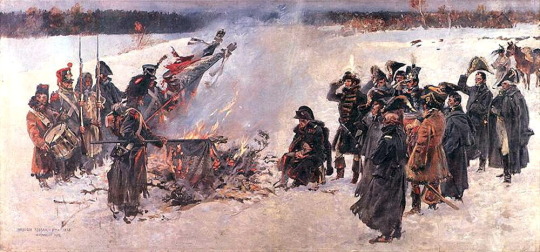
Wojciech Kossak, Burning banners, fragment of "Berezina" panorama
Some paintings, as, for example, the above placed part of Wojciech Kossak’s famous ‘Berezina Panorama’ show prince Poniatowski among Napoleon’s acting military commanders, but this does not reflect the reality. Because...
Well, prince Józef did present among French troops at that time and in that place, but was neither in command of the Polish corps, nor even able to stand.
To explain, however, the reason of such circumstances, we need to go back, for a month and 500 kilometers eastwards. Because there, near a town called Gzhatsk, on the 29th of October there had happened an accident with prince Józef.
Generał Poniatowski, as one of his adjutants, Józef Szumlanśki (more about him I wrote here), recalled, in a desire “to have a better look, spurred his huge English horse to jump onto an adjacent hill. The latter, unfortunately, turned to be rather steep, so the horse did not take the measure right and fell together with its rider...” Prince Józef thus was pinned down by his own horse, and for viewers, the incident looked so terrifying that they believed that Poniatowski had been killed in it!
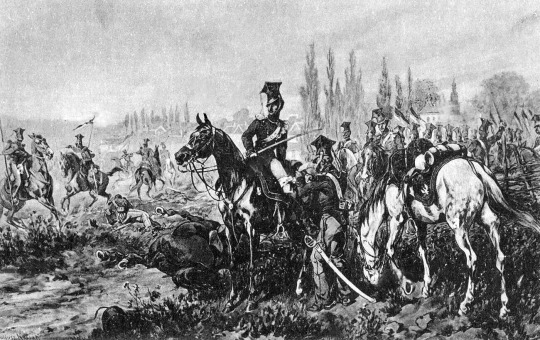
A French engraving, showing prince Poniatowski and the polish lancers during the Russians campaign in 1812
I haven't been able to find any image depicting such a frightening event as described above, so as an illustration to it let me put one with prince Józef riding horse and a one lying near.
And regarding prince Józef’s state after such an incident - well, in fact, as you all know, it didn’t kill him, but its consequences were severe ones. It took a lot of time for doctors to stop bleeding, with the high probability Poniatowski had got brain concussion (though such a diagnosis had not been made that time), and, what’s more essential, prince Józef leg had been dislocated.
A man with such a trauma, of course, wasn’t able to ride a horse and thus general Poniatowski had to hand command of the Polish corps to general Zajączek. The only mean of transportation left to prince Józef in such condition as his was a carriage. And the only road - to the west, together with the rest of Napoleon’s troops.
Initially, Poniatowski’s carriage was riding together with the Polish corps, but by arriving to Berezina had been moved, for greater safety, to the group of vehicles of the imperial guard, who were to cross the river much earlier than the Poles. (This circumstance is a rather important one, being it otherwise - prince Józef’s destiny might have been different...)
And thus we’ve come to Berezina, or - more precisely, to its crossing by the Grand Armée.
I won’t write about the battle itself, neither about the courage of the French pontooners - these brave deeds are out of this post’s topic - but what I ought to mention are throngs of people in queues to cross the river and difficulty of getting even into these queues.
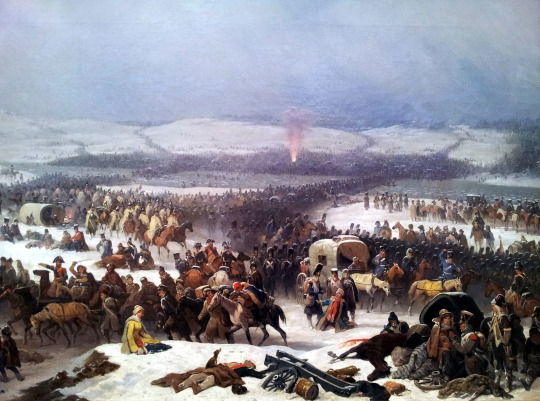
January Suchodolski, Napoleon's troops crossing the Berezina River
Being not on horseback, prince Józef had to wait his carriage’s turn. In the evening of the 27th of November it still had a three quarters of the mile to the nearest bridge, and the chances of being left on Berezina’s eastern side (and thus being eventually captured by Russians) were increasing with with every hour of waiting.
And then colonel Szumlański, the adjutant of Poniatowski I’ve mentioned above, came up with a tricky idea. As he later recalled: I found a detachment of the Guard's gendarmes who, partly at my most urgent requests, partly with generous pay, came to my aid. Shouting "by order of the Emperor”, they...” made all the vehicles standing in the line before prince Józef to have made him way, pushing aside or capsized those who couldn’t have done it by themselves. “By half past three in the morning this operation was successfully completed.”

Maria Artwińska, The White Lady of the Poniatowski family over prince Józef’s carriage near Berezina
As the final illustration of the post let me place a drawing by the Polish painter Maria Artwińska, who depicted prince Józef’s carriage together with... a ghost. The latter is the notorious White Lady of the Poniatowski family, which allegedly appeared before them at crucial moment of their lives'. Prince Józef is said to see the ghost thrice, first time at Berezina, then during the May night in Kraków, when making a final decision to stay with Napoleon, and finally - in the battle of Leipzig, shortly before his death.
#Poniatowski#józef poniatowski#battle of berezina#1812#józef poniatowski's last year#napoleon#berezina#wojciech kossak#january suchodolski#maria artwińska#the white lady of the poniatowskis
47 notes
·
View notes
Text
Przyczyny powstania listopadowego
Sytuacja w Królestwie Polskim przed powstaniem:
władzę sprawują: wlk. książę Konstanty Romanow i Nikołaj Nowosilcow
namiestnik - gen. Józef Zajączek
nierespektowanie konstytucji (”Konstytucja na stole, a bat pod stołem”)
car zwlekał z zapowiadanym przyłączeniem ziem zabranych do Królestwa
od 1819 - cenzura prasowa, inwigilacja i aresztowania polityczne
zliwkidowanie jawności obrad sejmu
represje względem legalnej opozycji (np kaliszan)...
... co doprowadzi do zawiązywania się stowarzyszeń spiskowych
nowy car Mikołaj I - zagorzały przeciwnik autonomii Polaków
1830r. - klęska nieurodzaju i wzrost niezadowolenia społeczeństwa
Wydarzenia w zachodniej Europie (Francja i Belgia) wzmacniały nastroje propowstaniowe
Kaliszanie - opozycja liberalno-konstytucyjna utworzona w sejmie przez braci Niemojewskich (Wincenty i Bonawentura). Ich postulaty...:
obrona jawności obrad sejmu
przestrzeganie konstytucji
wolność osobista, słowa i wyznania
monarchia konstytucyjna
swoboda działalności gospodarczej
uwłaszczenie lub chociaż oczynszowanie chłopów
rozszerzanie swobód i praw obywatelskich
... nie podobały się carowi i doprowadziły do zaostrzenia cenzury, zaprzestania obrad sejmu (aż do 1825r.) oraz do poważnych represji członków opozycji. Później kaliszanie stanowili jedną z głównych sił politycznych w czasie powstania listopadowego.
Związki spiskowe (konspiracyjne):
Związek Wolnych Polaków
Towarzystwo Filomatów (miłośników nauki)
- potem Filaretów (miłośników cnoty) *założone przez Mickiewicza i Tomasza Zana*
Wolnomularstwo Narodowe *Walerian Łukasiński*
Towarzystwo Patriotyczne *Walerian Łukasiński*
Sprzysiężenie Podchorążych *Piotr Wysocki*
Wydarzenia, które doprowadziły bezpośrednio do wybuchu powstania:
rozpoczęcie aresztowań podchorążych
fake news w prasie o powszechnej mobilizacji do wojska carskiego w celu interwencji na zachodzie Europy
0 notes
Text
Friends, enemies, comrades, Jacobins, Monarchist, Bonapartists, gather round. We have an important announcement:
The continent is beset with war. A tenacious general from Corsica has ignited conflict from Madrid to Moscow and made ancient dynasties tremble. Depending on your particular political leanings, this is either the triumph of a great man out of the chaos of The Terror, a betrayal of the values of the French Revolution, or the rule of the greatest upstart tyrant since Caesar.
But, our grand tournament is here to ask the most important question: Now that the flower of European nobility is arrayed on the battlefield in the sexiest uniforms that European history has yet produced (or indeed, may ever produce), who is the most fuckable?
The bracket is here: full bracket and just quadrant I
Want to nominate someone from the Western Hemisphere who was involved in the ever so sexy dismantling of the Spanish empire? (or the Portuguese or French American colonies as well) You can do it here
The People have created this list of nominees:
France:
Jean Lannes
Josephine de Beauharnais
Thérésa Tallien
Jean-Andoche Junot
Joseph Fouché
Charles Maurice de Talleyrand
Joachim Murat
Michel Ney
Jean-Baptiste Bernadotte (Charles XIV of Sweden)
Louis-Francois Lejeune
Pierre Jacques Étienne Cambrinne
Napoleon I
Marshal Louis-Gabriel Suchet
Jacques de Trobriand
Jean de dieu soult.
François-Étienne-Christophe Kellermann
17.Louis Davout
Pauline Bonaparte, Duchess of Guastalla
Eugène de Beauharnais
Jean-Baptiste Bessières
Antoine-Jean Gros
Jérôme Bonaparte
Andrea Masséna
Antoine Charles Louis de Lasalle
Germaine de Staël
Thomas-Alexandre Dumas
René de Traviere (The Purple Mask)
Claude Victor Perrin
Laurent de Gouvion Saint-Cyr
François Joseph Lefebvre
Major Andre Cotard (Hornblower Series)
Edouard Mortier
Hippolyte Charles
Nicolas Charles Oudinot
Emmanuel de Grouchy
Pierre-Charles Villeneuve
Géraud Duroc
Georges Pontmercy (Les Mis)
Auguste Frédéric Louis Viesse de Marmont
Juliette Récamier
Bon-Adrien Jeannot de Moncey
Louis-Alexandre Berthier
Étienne Jacques-Joseph-Alexandre Macdonald
Jean-Mathieu-Philibert Sérurier
Catherine Dominique de Pérignon
Guillaume Marie-Anne Brune
Jean-Baptiste Jourdan
Charles-Pierre Augereau
Auguste François-Marie de Colbert-Chabanais
England:
Richard Sharpe (The Sharpe Series)
Tom Pullings (Master and Commander)
Arthur Wellesley, 1st Duke of Wellington
Jonathan Strange (Jonathan Strange & Mr. Norrell)
Captain Jack Aubrey (Aubrey/Maturin books)
Horatio Hornblower (the Hornblower Books)
William Laurence (The Temeraire Series)
Henry Paget, 1st Marquess of Anglesey
Beau Brummell
Emma, Lady Hamilton
Benjamin Bathurst
Horatio Nelson
Admiral Edward Pellew
Sir Philip Bowes Vere Broke
Sidney Smith
Percy Smythe, 6th Viscount Strangford
George IV
Capt. Anthony Trumbull (The Pride and the Passion)
Barbara Childe (An Infamous Army)
Doctor Maturin (Aubrey/Maturin books)
William Pitt the Younger
Robert Stewart, 2nd Marquess of Londonderry (Lord Castlereagh)
George Canning
Scotland:
Thomas Cochrane
Colquhoun Grant
Ireland:
Arthur O'Connor
Thomas Russell
Robert Emmet
Austria:
Klemens von Metternich
Friedrich Bianchi, Duke of Casalanza
Franz I/II
Archduke Karl
Marie Louise
Franz Grillparzer
Wilhelmine von Biron
Poland:
Wincenty Krasiński
Józef Antoni Poniatowski
Józef Zajączek
Maria Walewska
Władysław Franciszek Jabłonowski
Adam Jerzy Czartoryski
Antoni Amilkar Kosiński
Zofia Czartoryska-Zamoyska
Stanislaw Kurcyusz
Russia:
Alexander I Pavlovich
Alexander Andreevich Durov
Prince Andrei (War and Peace)
Pyotr Bagration
Mikhail Miloradovich
Levin August von Bennigsen
Pavel Stroganov
Empress Elizabeth Alexeievna
Karl Wilhelm von Toll
Dmitri Kuruta
Alexander Alexeevich Tuchkov
Barclay de Tolly
Fyodor Grigorevich Gogel
Ekaterina Pavlovna Bagration
Ippolit Kuragin (War and Peace)
Prussia:
Louise von Mecklenburg-Strelitz
Gebard von Blücher
Carl von Clausewitz
Frederick William III
Gerhard von Scharnhorst
Louis Ferdinand of Prussia
Friederike of Mecklenburg-Strelitz
Alexander von Humboldt
Dorothea von Biron
The Netherlands:
Ida St Elme
Wiliam, Prince of Orange
The Papal States:
Pius VII
Portugal:
João Severiano Maciel da Costa
Spain:
Juan Martín Díez
José de Palafox
Inês Bilbatua (Goya's Ghosts)
Haiti:
Alexandre Pétion
Sardinia:
Vittorio Emanuele I
Lombardy:
Alessandro Manzoni
Denmark:
Frederik VI
Sweden:
Gustav IV Adolph
45 notes
·
View notes
Text
We have finally reached the end of the first round, reducing our 128 person list to 64.
Here is the complete list of who is competing in round 2:
France:
Jean Lannes
Thérésa Tallien
Antoine Charles Louis de Lasalle
Germaine de Staël
François Joseph Lefebvre
Géraud Duroc
Étienne Jacques-Joseph-Alexandre Macdonald
Auguste François-Marie de Colbert-Chabanais
Thomas-Alexandre Dumas
Juliette Récamier
Louis-Francois Lejeune
Louis-Alexandre Berthier
Michel Ney
Joseph Fouché
Nicolas Charles Oudinot
Auguste Frédéric Louis Viesse de Marmont
Jean-Andoche Junot
Josephine de Beauharnais
Andrea Masséna
Joachim Murat
Pauline Bonaparte, Duchess of Guastalla
England:
Richard Sharpe
Tom Pullings
Benjamin Bathurst
Horatio Nelson
Barbara Childe
Robert Stewart, 2nd Marquess of Londonderry (Lord Castlereagh)
Captain Jack Aubrey
Horatio Hornblower
Admiral Edward Pellew
Arthur Wellesley, 1st Duke of Wellington
Emma, Lady Hamilton
Scotland:
Thomas Cochrane
Ireland:
Doctor Stephen Maturin
Austria:
Friedrich Bianchi, Duke of Casalanza
Klemens von Metternich
Marie Louise
Wilhelmine von Biron
Archduke Karl
Poland:
Wincenty Krasiński
Józef Zajączek
Zofia Czartoryska-Zamoyska
Józef Antoni Poniatowski
Maria Walewska
Russia:
Prince Andrei Bolkonsky
Levin August von Bennigsen
Pavel Stroganov
Barclay de Tolly
Ekaterina Pavlovna Bagration
Alexander Andreevich Durov
Karl Wilhelm von Toll
Mikhail Miloradovich
Alexander I Pavlovich
Empress Elizabeth Alexeievna
Pyotr Bagration
Prussia:
Louise von Mecklenburg-Strelitz
Frederick William III
Friederike of Mecklenburg-Strelitz
Alexander von Humboldt
Dorothea von Biron
The Netherlands:
Ida St Elme
Spain:
Juan Martín Díez
José de Palafox
Lombardy:
Alessandro Manzoni
21 notes
·
View notes
Text
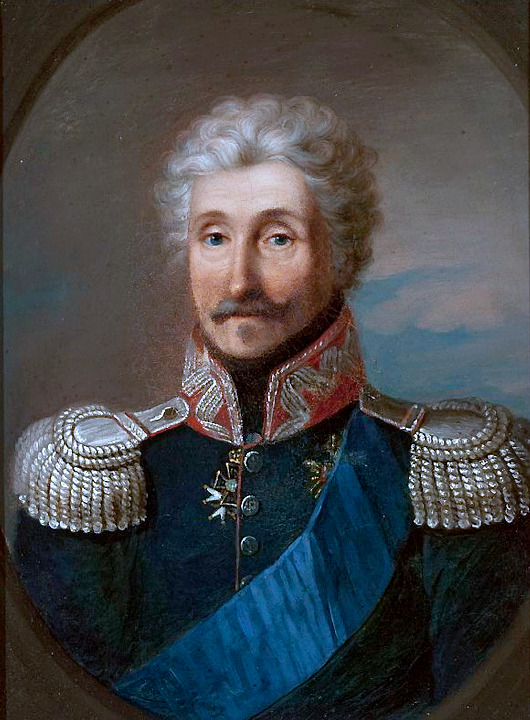
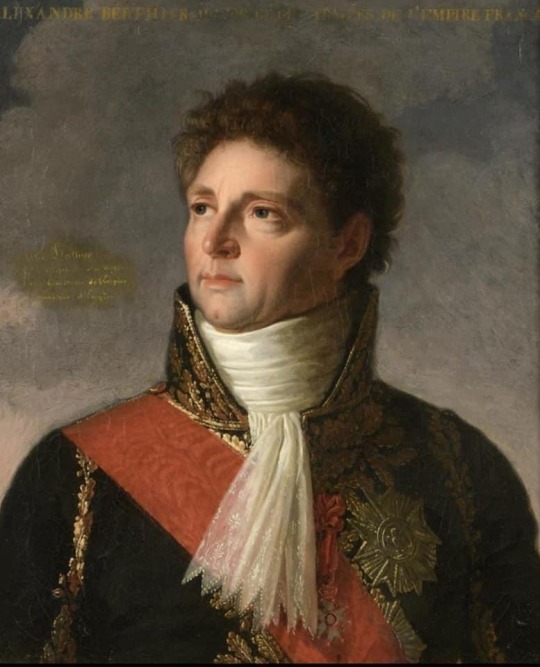

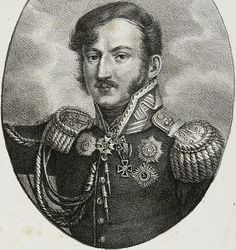
Propaganda for each:
Zajączek
"Listen, he was over fifty during the wars (and certainly not as beautiful as his wife the cryotherapy enjoyer), failed severely when given command in Warsaw during Kościuszko's uprising (Russians then massacred civilians in the district he was defending) later on also served the Tsar; still, he undeniably kind of had cute eyes. My main point is that we need him here because he fits the Tumblr tradition of nominating absolute losers. A sopping wet cat. A tiny hare, if you will.”
Berthier:
a. “Prodigial brainpower!!!! (I am sapiosexual!!!!) Able to work long hours!!! The fact that he would be so devoted to the love of his life (Madame Visconti), so much that he arranaged a ménage à trois. Very powerful. He was also always laughing before everything fell apart.”
Von Biron:
"A great beauty and gracious hostess, possibly the most beautiful of four extraordinarily attractive and scandalous sisters, said to posses an extraordinary charm. But what makes her The Sexyman is the feat of managing to captivate the old wily devil Talleyrand and becoming the greatest and last love of his life… while, technically, being his niece by marriage.”
Krasiński:
a. "Obviously SOMEONE thought he was a sexyman because he fathererd Zygmunt Krasiński, one of Poland's Three Bards—Poland's greatest romantic poets. HELLO.”
#napoleonic sexyman tournament#winning this poll won't take them out#it will just mean they need to duke it out with whoever wins the redemption poll
19 notes
·
View notes
Text
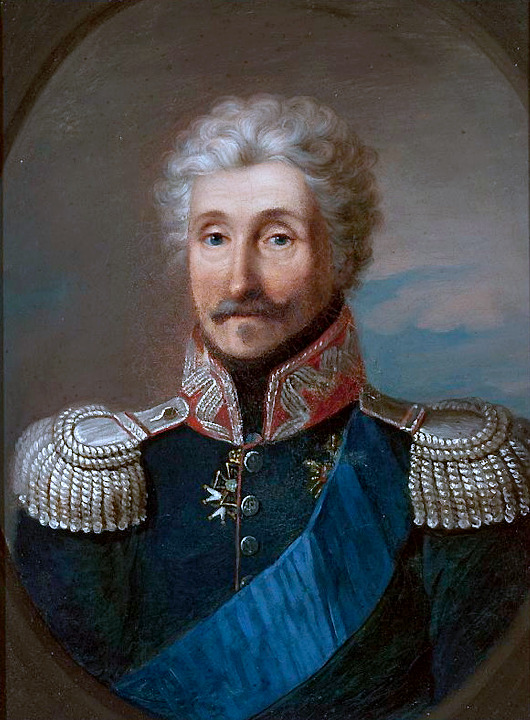

Józef Zajączek:
"Listen, he was over fifty during the wars (and certainly not as beautiful as his wife the cryotherapy enjoyer), failed severely when given command in Warsaw during Kościuszko's uprising (Russians then massacred civilians in the district he was defending) later on also served the Tsar; still, he undeniably kind of had cute eyes. My main point is that we need him here because he fits the Tumblr tradition of nominating absolute losers. A sopping wet cat. A tiny hare, if you will.”
François Joseph Lefebvre:
a. “Total DILF material, and the fiery passion in his eyes was matched only by his fiery personality! This contest may be based on looks (and Lefebvre is a strong candidate on this metric alone); but it's hard not to fall in love with his spicy takes and saucy language. He told Napoleon, "Let us throw the lawyers into the river” after agreeing to help overthrow the Directory (quoted in David G. Chandler, ed., Napoleon's Marshals), and from his English Wikipedia article: When a friend expressed envy of his estate, Lefebvre said, "Come down in the courtyard, and I'll have ten shots at you with a musket at 30 paces. If I miss, the whole estate is yours." After the friend declined this offer, Lefebvre added, "I had a thousand bullets shot at me from much closer range before I got all this." In response to a clueless young man demanding his identity at a social event, he answered, ''Je viens de la lune, où je n'ai jamais vu un Jean-Foutre de ton espèce: Je m'appelle le Général Lefebvre!” [“I come from the moon, where I’ve never seen such a #*$& as you. My name is General Lefevre!”] Quoted in The Secret History of the Cabinet of Bonaparte by Lewis Goldsmith, 1810, which is also hilarious because the author clearly hates Lefebvre, but makes him sound like a cool badass. He earns additional sexy points by sticking by his ex-washerwoman wife, who had a mouth of her own. (tbh Catherine Lefebvre, “Madame Sans-Gêne,” deserves her own Napoleonic Sexyman [gender neutral] nomination).”
13 notes
·
View notes
Text


Józef Zajączek:
Propaganda:
"Listen, he was over fifty during the wars (and certainly not as beautiful as his wife the cryotherapy enjoyer), failed severely when given command in Warsaw during Kościuszko's uprising (Russians then massacred civilians in the district he was defending) later on also served the Tsar; still, he undeniably kind of had cute eyes. My main point is that we need him here because he fits the Tumblr tradition of nominating absolute losers. A sopping wet cat. A tiny hare, if you will.”
François-Étienne-Christophe Kellermann
Propaganda:
“Tbh, I’m nominating him for shits and giggles.”
12 notes
·
View notes
Text
With two days left to submit nominees, here is where the list stands:
France:
Jean Lannes
Josephine de Beauharnais
Thérésa Tallien
Jean-Andoche Junot
Joseph Fouché
Charles Maurice de Talleyrand
Joachim Murat
Michel Ney
Jean-Baptiste Bernadotte (Charles XIV of Sweden)
Louis-Francois Lejeune
Pierre Jacques Étienne Cambrinne
Napoleon I
Marshal Louis-Gabriel Suchet
Jacques de Trobriand
Jean de dieu soult.
François-Étienne-Christophe Kellermann
Louis Davout
Pauline Bonaparte, Duchess of Guastalla
Eugène de Beauharnais
Jean-Baptiste Bessières
Antoine-Jean Gros
Jérôme Bonaparte
Andrea Masséna
Antoine Charles Louis de Lasalle
Germaine de Staël
Thomas-Alexandre Dumas
René de Traviere (The Purple Mask)
Claude Victor Perrin
Laurent de Gouvion Saint-Cyr
François Joseph Lefebvre
Major Andre Cotard (Hornblower Series)
Edouard Mortier
Hippolyte Charles
Nicolas Charles Oudinot
Emmanuel de Grouchy
Pierre-Charles Villeneuve
Géraud Duroc
Georges Pontmercy (Les Mis)
Auguste Frédéric Louis Viesse de Marmont
Juliette Récamier
Bon-Adrien Jeannot de Moncey
Louis-Alexandre Berthier
Étienne Jacques-Joseph-Alexandre Macdonald
Jean-Mathieu-Philibert Sérurier
Catherine Dominique de Pérignon
England:
Richard Sharpe (The Sharpe Series)
Tom Pullings (Master and Commander)
Arthur Wellesley, 1st Duke of Wellington
Jonathan Strange (Jonathan Strange & Mr. Norrell)
Captain Jack Aubrey (Aubrey/Maturin books)
Horatio Hornblower (the Hornblower Books)
William Laurence (The Temeraire Series)
Henry Paget, 1st Marquess of Anglesey
Beau Brummell
Emma, Lady Hamilton
Benjamin Bathurst
Horatio Nelson
Admiral Edward Pellew
Sir Philip Bowes Vere Broke
Sidney Smith
Percy Smythe, 6th Viscount Strangford
George IV
Capt. Anthony Trumbull (The Pride and the Passion)
Barbara Childe (An Infamous Army)
Doctor Maturin (Aubrey/Maturin books)
Scotland:
Thomas Cochrane
Colquhoun Grant
Austria:
Klemens von Metternich
Friedrich Bianchi, Duke of Casalanza
Franz I/II
Archduke Karl
Marie Louise
Franz Grillparzer
Wilhelmine von Biron
Poland:
Wincenty Krasiński
Józef Antoni Poniatowski
Józef Zajączek
Maria Walewska
Władysław Franciszek Jabłonowski
Adam Jerzy Czartoryski
Antoni Amilkar Kosiński
Zofia Czartoryska-Zamoyska
Stanislaw Kurcyusz
Russia:
Alexander I Pavlovich
Alexander Andreevich Durov
Prince Andrei (War and Peace)
Pyotr Bagration
Mikhail Miloradovich
Levin August von Bennigsen
Pavel Stroganov
Empress Elizabeth Alexeievna
Karl Wilhelm von Toll
Dmitri Kuruta
Alexander Alexeevich Tuchkov
Barclay de Tolly
Fyodor Grigorevich Gogel
Ekaterina Pavlovna Bagration
Prussia:
Louise von Mecklenburg-Strelitz
Gebard von Blücher
Carl von Clausewitz
Frederick William III
Gerhard von Scharnhorst
Louis Ferdinand of Prussia
Friederike of Mecklenburg-Strelitz
Alexander von Humboldt
Dorothea von Biron
The Netherlands:
Ida St Elme
Wiliam, Prince of Orange
The Papal States:
Pius VII
Portugal:
João Severiano Maciel da Costa
Spain:
Juan Martín Díez
José de Palafox
Inês Bilbatua (Goya's Ghosts)
Haiti:
Alexandre Pétion
Sardinia:
Vittorio Emanuele I
Denmark:
Frederik VI
Sweden:
Gustav IV Adolph
11 notes
·
View notes
Text
Prince Józef’s “frenemies”
Good day, dear friends, and let the topic of this week’s post be Józef Poniatowski’s “frenemies“ (or, in longer words, people from Poland and France - fellow countrymen and representatives of allies - with whom prince Józef wasn’t in good terms).
Yes, as any other man Poniatowski didn’t have good relations with each and every person. In his youth, for example, he was dislike by some people for the gallant lifestyle; in times when Warsaw used to be a Prussian provincial city Poniatowski and his close circle were criticized for preferring the French Theater to the one, where performances were played in Polish.
(Maybe be one day I’ll write more on the topic, but because most of you are interested more in Napoleonic epoch, let’s start today from people and events related to the Duchy of Warsaw).
So, the first conflict happened already in January 1807, when prince Józef was chosen over generals Dąbrowski and Zajączek to become the Director of War (in October of 1807 the position was renamed to the “Minister of War”) of the Duchy. And, if to have a look to biographies of both of them we’ll see that each had enough reasons to expect that the position would become his.
Jan Henryk Dąbrowski
Let us start with Jan Henryk Dąbrowski.

Unidentified Polish painter, Portrait of Jan Henryk Dąbrowski, 19th century
He was 8 years older (born in 1755) than Poniatowski. And, same as prince Józef, Jan Henryk grew up not in Poland, but in a German speaking country. In Dąbrowski’s case it was Saxony, where his father served in the Saxon Army. And Jan Henryk himself started his military career there.
In the beginning of 1790ies, however, Dąbrowski followed the appeal of Great Sejm and returned to his motherland, where participated both in Polish-Russian War of 1792 and the Kościuszko Uprising.
After the Third Partition of Poland general Dąbrowski turned his attention to France - the country which, having abolished its monarchy, was seen by many Poles as the only country who might have helped them. And there, indeed, with support of Napoleon Bonaparte, the Polish Legions were created.
Of course, Dąbrowski commanded only one of the Legions (among other commanders there were, for example, Karol Kniaziewicz and Józef Wybicki), but it was his name which was mentioned in the Legions’ anthem. So, when the Legions, where many a Poles joined hoping this would have brought freedom to their country, in 1806 finally entered the former Polish territory, it was more than expected that just general Dąbrowski would be made the head of the army of the future Polish country.
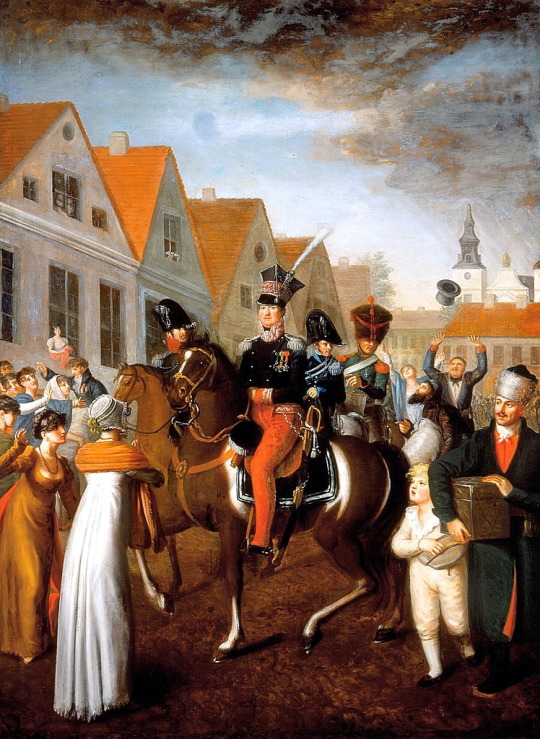
Jan Gładysz, Jan Henryk Dąbrowski's entry to Poznań, ci. 1809
But the choice, as we all know, was made for Poniatowski. (So, as you can see, Jan Henryk Dąbrowski' had enough reasons to have a grudge against prince Józef.) But I can’t help mentioning that when the situation was really serious, like in 1809 or 1812-13, both generals Dąbrowski and Poniatowski were able to forget their disagreements and to join their efforts in serving their motherland together.
Btw, there is one more thing (though a totally speculative one) I feel I must write about Dąbrowski.
As I wrote above, he participated in Napoleon’s German campaign of 1813, and in the battle of Leipzig itself. Furthermore, there, in Leipzig, there was present his second wife, Barbara, who, btw, was more than 25 years younger than Jan Henryk. (They married in 1807.)
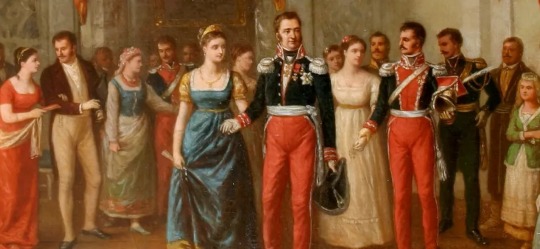
Feliks Sypniewski, The wedding of Jan Henryk Dąbrowski and Barbara Chłapowska (fragment), 19th century
So, if imagine, for a moment, that not but Poniatowski but Dąbrowski would have been killed at Leipzig... and taking into account all the above-mentioned romantic background (and the fact that the Legions’ anthem is now the anthem of Poland)... who knows, a monument to whom would have stayed now in front of the Presidential Palace in Warsaw.
But history, as we know, knows no ‘what if’s. So let me finish this part with a shrt description of general Dąbrowski‘s later years. Becoming the commander in chief of the all remaining Polish forces soon after prince Józef’s death he followed Napoleon to Paris, but in 1815, after creation the Kingdom of Poland as a Russian satellite state offered his services to this new power. The proposition to become the Viceroy (Namestnik) of the Kingdom of Poland was made for him, but Dąbrowski declined it. At the end of 1815 he retired from military service, and three years later died in his estate in the lands which that time belonged to Prussia.
That was all about Jan Henryk Dąbrowski, and now let us switch to the person who did accept the proposition of becoming the Namestnik and who also was prince Poniatowski’s frenemy.
So, please meet the general Józef Zajączek.
Józef Zajączek

Anonymous painter, portrait of a general Józef Zajączek, 19th century
Being born in 1752 Zajączek was older even than Dąbrowski. And before 1792, when during the Polish-Russian war his path crossed with the one of prince Józef, Zajączek had a kind of military and diplomatic career behind him. He visited Paris and Istanbul as a member of Polish diplomatic missions. He fought in the War of the Bar Confederation, and for some time served in French Army. And though he supported the newly accepted constitution in 1791, he didn’t like the king Stanisław August himself.
And it looks like that from that antipathy towards Poniatowski-king Zajączek’s dislike for his namesake for Poniatowski-prince grew from.
But, apart from this, in 1792 there happened a real conflict between two Józefs (and not without “participation” of Stanisław August). Because when in summer of that year the Polish king, having decided that there was no more sense in fighting Russians, ordered his troops to capitulate, the Polish military chiefs weren’t ready to accept such a command at once (because after weeks of retreat the Polish Army that time finally began to overcome the Russians).

Access of Stanisław August Poniatowski in to Targowicka confederation July 24 1792
So, not wanting to surrender, some high officers decided they should go to Warsaw, kidnap the king and force him to cancel the shameful order. Józef Zajączek was among them. Józef Poniatowski was totally against it.
And though the kidnapping didn’t occur, two Józef’s animosity was flared up.
Like Poniatowski, general Zajączek participated in Kościuszko’s uprising in 1794. And like Kościuszko himself, he was captured. But caught he was by Austrians, and after a year only in prison - released.
Then Zajączek went to France, where he joined the French Army, in 1797 Napoleon recognized him as an active general in the French Service (Zajączek didn’t join the Legions, because many a Poles from there remembered him from the times of 1794 Uprising and blamed for the massacres the Russian troops did in Warsaw’s suburb named Praga).
So Zajączek served in French Army as a French general, participated in Napoleon’s Egyptian expedition, then in the War of the Third Coalition in 1805.

André Dutertre, portrait of a general Józef Zajączek during the Egyptian campaign, between 1798 and 1801
Next year, 1806, in the War of the Fourth Coalition, he was assigned to command one of the Legions entering former Polish territory, and then to create another legion from the Poles already there. So not surprisingly he as well expected to become the Director of War (the position was later renamed to “Minister“) of the newly created Duchy of Warsaw.
And when his longtime foe Józef Poniatowski got the position Zajączek was more than dissatisfied. He refused to obey Poniatowski’s orders, and wrote in answer:
I am a French officer, I have command over the Poles, because this is what the emperor wanted, I do not depend on you at all... I expect nothing from the Polish government, I owe everything to the French Emperor... I warn you once and for all that I do not want to have anything more with you to do...
However, like Dąbrowski, in 1809 and 1812 Zajączek had to subdue ambitions and cooperate with Poniatowski. But, in comparison with the former, Zajączek didn’t participate in 1813 campagne. Because was wounded in the battle of Berezina in November 1812 (Dominique Larrey had to amputate his leg) and then captured by Russians.

Fording the Berezina River by January Suchodolski, ca. 1859
What happened next? After being almost 2 years in prison Zajączek return to Poland, and in 1815 tsar Aleksander, crowned as a new Polish King, proposed him the post of the Viceroy. Which position the namesake of prince Józef hold more than 10 years, till his death in 1826. In 1818 he even got a title of prince from the tsar, so since that time he might also be called “prince Józef”.
Ok, and what about Zajączek’s private life? You’ll be surprised, but in this area there were some similarities between him and Józef Poniatowski. Because first Józef’s sweetheart, Aleksandra Pernet, was of a French origin (though she was born in Poland). And married when they met. But that’s all, because, in comparison with Henriette de Vauban Aleksandra was 2 years younger than her Józef. And, what’s more, Zajączek was able to help divorce her husband, and in 1786 these two were able to marry.

Louis-François Marteau, Portrait of Aleksandra Pernett, ci. 1780
And - can’t help but mention, Zajączek’s wife was known for her beauty, which she was able to keep till the very old age.
And we’ll move now to the next person, whom prince Józef was in bad terms with. Namely - general Michał Sokolnicki.
Michał Sokolnicki
And, in comparison with Dąbrowski and Zajączek, Poniatowski and Sokolnicki’s conflict happened quite late, in 1809.
Being almost a peer of prince Józef (born in 1760), Michał Sokolnicki participated both in Russian-Polish war, and in Kościuszko Uprising, was a member of the Polish legions, and transferred to the Army of the Duchy of Warsaw in 1807.

Jan Gładysz, portrait of a general Michał Sokolnicki, 1815
The problems started, as I mentioned before, during the Polish Austrian War of 1809. Because Sokolnicki, who participated in battles of Raszyn, Grochów, Góra Kalwaria and Sandomierz, and was decorated with the Polish Order Virtuti Military and the French Legion of Honour, still felt he was underestimated.
So in 1810 he asked for a leave - saying he needed to fix his health - and went to Paris. And when Sokolnicki didn’t return to Poland in time prince Józef had to remove him from the active service (in December 1811). Full of resent, Sokolnicki then joined the French service and, staying by Napoleon's side, intrigued against Poniatowski.
And it is highly probable that due Sokolnicki’s effort prince Poniatowski, in 1812, acquired the next (this time a French one) “enemy”.
And this “frenemy” was none other than... the Emperor’s own brother, Jérôme Bonaparte.
Jérôme Bonaparte
The youngest Napoleon’s brother (born in 1784) belonged rather not to prince Józef’s generation, but to the next one. And definitely wasn’t so military talented as the Emperor himself. And preferred luxury life style even on march, in the campain of 1812, when every minute and hour was crucial.

Sophie Lienard, portrait of Jérôme Bonaparte
So no wonder that part of the Grand Armeé Jérôme commanded allowed Russian troops to leave unscathed. But the responsibility for this, not without assistance of the above mentioned general Sokolnicki, was shifted to the shoulders of... prince Józef. (Why Sokolnicki needed this - well, it is highly probable he counted on Poniatowski’s dismission which would have made prince Józef’s position opened to Sokolnicki himself) And Napoleon - as diarists recall - did not accept any excuses and subjected prince Joseph's to very harsh criticism. Which, in turn, might have been the reason why Napoleon didn’t listen to Poniatowski after the battle of Smolensk, when the latter pleaded the emperor to turn the army south instead of going east.
But this is another speculation.
What I am pretty sure - though I have to admit I never read direct mentions about it - is that after such a military failure (and following tongue-lashing) Józef Poniatowski and Jérôme Bonaparte could not have been in good terms anymore.
That’s all for today, thanks for reading!
#Poniatowski#Jozef Poniatowski#Napoleon Bonaparte#Napoleonic Wars#dąbrowski#Jan Henryk Dąbrowski#Józef Zajączek#Michał Sokolnicki#jérôme bonaparte
22 notes
·
View notes
Note
Hello, I've scrolled through your blog to make sure, this question wasn't asked before, but it would seem that it wasn't (though I could've missed it). Can I please ask you of prince Poniatowski's attitude towards Napoleon?
No, this question has not been asked yet, and thank you very much for sending it! It will be my please to write a answer to this.
Relationship between prince Józef Poniatowski and the emperor Napoleon Bonapart
I am sorry, this turned out to be a very long read, and on the topic a little bit wider than asked, so I had to specify the title and give the short answer for those who aren’t interested in details.
So in brief - Poniatowski respected Napoleon, but wasn’t a blind worshipper of the emperor. And in situations when in the balance there might have been Napoleon and Poland, and only one thing was to be chosen for prince Józef this one definitely would be his motherland.

Bronisław Gembarzewski, prince Józef and Napoleon
Emperor Napoleon, as all fans of the epoch knows, first arrived to Warsaw in December of 1806. But to start the long-read about relationship between the emperor and the prince properly we need make a step backwards, to understand what these two thought about each other on the moment of their first meeting.
Prince Józef, in comparison with many of his country men, participated in none of general Bonapart’s campaigns. What’s more - when the count of Provence, future king Louis XVIII resided in Warsaw in 1801-1804 he was an often visitor of Poniatowski’s palace. (So it may be said that before 1806 prince Józef was kind of a “royalist”.)
However, with Napoleon’s victory over Prussia and the emperor’s arrival to the former Polish lands chances of Poland rising from the dead skyrocketed! And prince Józef realized that he couldn’t have stayed away any longer, that if he wanted to participate in his motherland reappearing on the map of Europe he had to join the French.
As for Napoleon - in 1806 the emperor of Frenchmen didn’t have any warm feeling towards the nephew of the last king of Poland. One of the reason was that Claude Carloman de Rulhière, with whose book Histoire de l’anarchie de Pologne Napoleon had studied history of lands he was going conquer, wasn’t sympnathising the Poniatowski family. As other reasons there may be named a fact, that that time in French Army there were other Poles, whom the emperor knew better, like generals Jan Henryk Dąbrowski and Józef Zajączek.
Nevertheless, because when leaving Warsaw the Prussians kinda left the city “in charge” of Poniatowski, Napoleon had to meet prince Józef on entering the city. And from the data I was able to find it looks like the first meeting of the emperor and the prince happened on the 19th of December.

Prince Józef with Napoleon during the war campaign - drawing by Wacław Lipiński
With this image I am obliged to make a small digression. Napoleon, as recent investigation show, was not that short as he was thought to be because of English cartoons. Józef Poniatowski, on the other hand, was described by the contemporaries as a man of the middle height. So, in my opinion standing side-by-side these two must have looked like as people of the same height.
With the emperor so prejudiced against prince Józef, you may ask, how did it happen that less than a month later, on the 14th of January 1807, the latter was appointed as a Director of War? (In October of 1807, after the Duchy of Warsaw was created, Poniatowski’s post acquired the name of “Minister of War”.)
The answer is that behind the event there was a long and complicated intrigue, in which were involved such people as Joachim Murat (with whom, as you may remember, prince Józef quickly became friends) and Charles Maurice de Talleyrand, that time Foreign Minister of France. (As for the latter - his protection was asked by Pepi’s sister, Teresa Tyszkiewicz.)
And I can’t help but mention that Poniatowski’s nomination nevertheless had some advantages, because in comparison with his “rivals” he was a representative of the aristocracy, what might have provided support to Napoleon from the Polish high-society.
And speaking of high-society I can’t help touching a rather delicate topic, related with Napoleon’s love life, with which Poniatowski - in comparison with what is thought about him - had nothing to do. Yes, I mean the story of prince Józef (and other Polish dignitaries) supposedly forcing Maria Walewska to give in to the emperor in exchange for “Poland’s resurrection”.
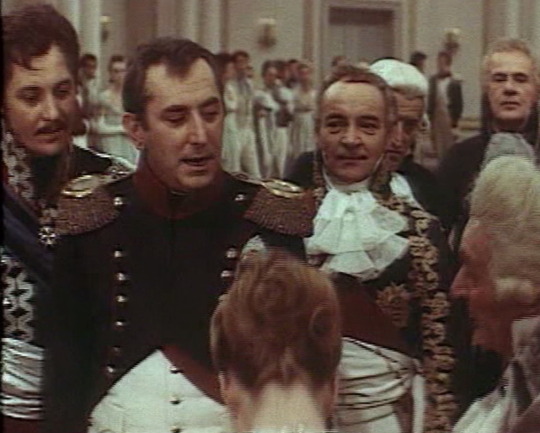
SCREENSHOT FROM THE MOVIE “MARYSIA I NAPOLEON”. From left to right - Zdzisław Makłakiewicz as prince Józef, Gustaw Holoubek as Napoleon, Beata Tyszkiewicz as Maria Walewska, Ignacy Machowski as Duroc, Kazimierz Rudzki as Talleyrand, Juliusz Łuszczewski as Anastazy Walewski
Many people believe in it because it is written in so-called Walewska’s memoirs, but the investigations of Polish historians (like, fir example, Marian Brandys) prove that not everything might have happened like it was described in the memoirs. And prince Poniatowski’s involvement in the story is one of the facts. (The closest connection he might have had with this is that Mme Henriette de Vauban, his mistress, might have tried to influence Mme Walewska. But this is definitely a topic to continue in - if at all - a separate post.
So, let’s return to relationship between Poniatowski and Napoleon.
In 1809 the Duchy of Warsaw was attacked by the Austrians, and the Army of the Duchy showed its combat strength, winning the war and taking back from the enemy a huge a part of former Polish territories. The emperor was impressed by prince Józef’s inferiors’ performance, till such a degree that he awarded the latter with the highest imperial order of merit, the cross of the Legion of Honour.
But this was done “by proxy”, and the next, after year 1807, meeting of these two happened only in 1811 in Paris, where Poniatowski was invited to attend the christening of Napoleon’s son, the king of Rome.
Prince Józef arrived to Paris on the 23rd of April, and in the evening of that very day received an invitation from the emperor to appear next day in Saint Clou. What’s more, Poniatowski’s visit was to be happen at once, without an obliged advance as the ceremony of representation by the Saxon ambassador.
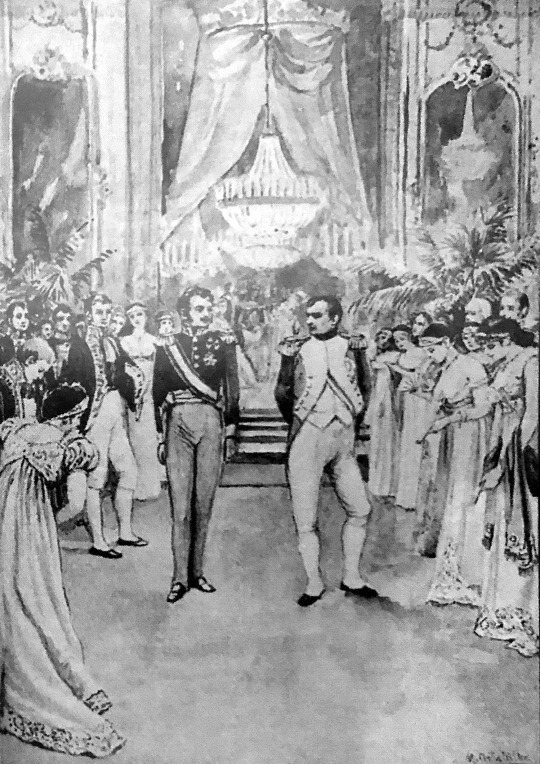
Prince Józef with Napoleon during the ceremonial audience at the Tuileries Palace - drawing by Maria Artwińska
And this is the image I like, because both - the prince and emperor - seem to have there the “correct” height!
Why was Napoleon so eager to see prince Józef? Well, at least because the latter brought with him news, which was dangerous to trust to paper. Namely - about planning Russian invasion of the Duchy and the tsar attempts to persuade the Polish Minister of War to switch sides and join the anti-napoleonic coalition. (Can’t help but mention there that Poniatowski revealed Napoleon mere facts, but not the names of the people communicating with him, in order not to put them in danger.)
And what about christening? Of course, prince Józef participated in the ceremony, and was even allowed to have an audience with the child-king. And, no doubts, there followed other court events, huntings, balls, etc. Old friend, Murat, and Poniatowski’s sister’s love interest, Talleyrand, introduced Pepi to the highest Parisian society. Also Pepi paid a visit to the ex-empress Josephine.

Prince Józef in conversation with Napoleon and the French Minister of Foreign Affairs, Talleyrand - drawing by Andrzej Zarzycki
And though initially prince Józef’s stay in the French capital was planned to be a couple of months, in fact it prolonged to four, till the emperor’s birthday. And leaving finally on the 27th of August Poniatowski received as a farewell gift a beautiful snuffbox planted with diamonds and a loan to… pay the debts of his sister Teresa.
And then there came the year 1812. Prince Józef was made the commander of the 5th Corps of the Grande Armée, and with the rest of the Army went to Russia.
However, above “The Polish corps” there was a commander not very competent and lucky, emperor’s younger brother Jérôme. And when it happened that the Russian Army under general Bagration managed to escape from the “second center” corps led by Jérôme, Napoleon blamed on this... prince Józef.
In the battle of Smolensk, however, the Vth Corps managed to distinguish to such a degree, that together with its commander it was mentioned in a bulletin of the Grande Armée.
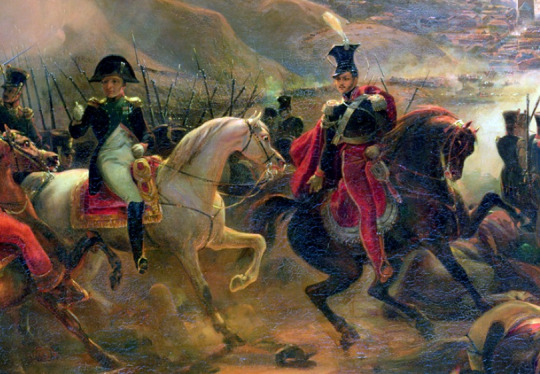
Jean-Charles Langlois, The Battle of Smolensk, 17th August 1812, detail
But after that battle there happened a very dramatic scene between the prince and the emperor. Because, as you might know, the city of Smolensk was the most eastern town ever belonged to Poland. So, if Napoleon’s goal was, as it had been proclaimed in the beginning of the war, to restore Poland, the Grande Armée should have stopped there, at Smolensk. Not to go further east.
And Poniatowski, as a witness of the scene, count Ostrowski, recalled, “begged Napoleon on his knees if not to direct the whole French Army to the south, to the former Polish lands, then at least to separated the Polish corps and send it along the Dnieper river, in the direction of Kiev...”
But emperor was implacable.
What happened next we all know. The battle of Moscow, fire, retreat…
In December Napoleon left his army and speeded to Paris. Prince Józef returned to Warsaw, to rebuild “the Polish corps”, to reenforce the people left with new conscripts and to be ready to join with these people the emperor. When the latter comes with fresh forces, to fight the coalition back.
But the emperor of French didn’t hurry to return to the East of Europe. Failing to wait him Poniatowski had to leave Warsaw, going with his soldiers to Kraków. And was waiting here, for almost three month.
To no avail.
At the beginning of May all the territory of the Duchy of Warsaw, except Kraków, was occupied by Russians. A lot of Polish officers, acquaintances and even friends of prince Józef, resigned from the army. A lot of them were persuading the Polish commander-in-chief to follow, to join the anti-napoleonic coalition.
And… well, here I can’t write that Poniatowski rejected these propositions, all and at once. No, he was listening, thinking over… Asking for terms and thoroughly pondering on what would have been better for his motherland - to stay with France or not.
And on the night from the 6th to the 7th of May, on the eve of his 50th birthday the decision was made.
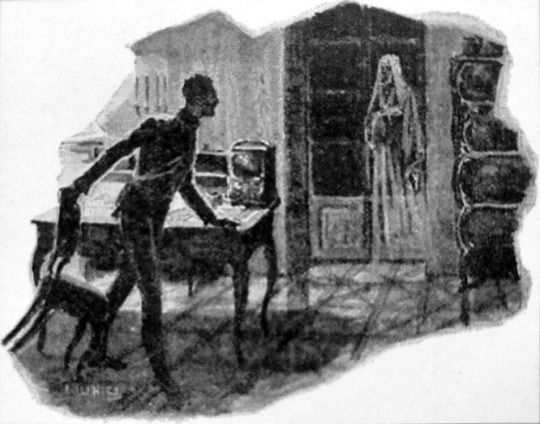
Prince Józef sees “the White Lady of the Poniatowski Family” on the night on 6/7 May 1813 in Krakow (drawing by Ludomir Ilinicz)
Having obtained no written guaranties from the other side, feeling that unconditional surrender - the only thing they were ready to accept from him - was not compatible with the soldier honor, the Polish Bayard decided to stay with Napoleon.
Although to make such a decision was for prince Józef extremely hard (especially if to take into account that he still had not got clear instructions from the emperor what to do). As Poniatowski confided next day to one of his colleagues that night thinking was so difficult to him that he even thought about shooting himself. Twice.
What is not proved - so this fact still stays a kind of legend - that that night prince Józef saw a ghost, the famous “White lady of Poniatowski family”. The fantom that was said to announce with its appearance very bad things to come…
And in 5 month there came… the battle of Leipzig.

Jean-Charles Langlois, The Battle of Leipzig (?)
This image is often signed as „the battle of Leipzig” though judging by the emperor’s, the prince’s and their horses’ poses I suppose it might be another version of “the battle of Smolensk”.
Of course, before Leipzig there was truce, then the battle of Dresden, then retreat and preparations. And in the beginning of the battle there was a moment when French victory still looked possible. But soon it turned out that it was an illusion.
And then the emperor… named general Poniatowski a marshal of France. Thus making him the only foreigner among that cream of French military elite.
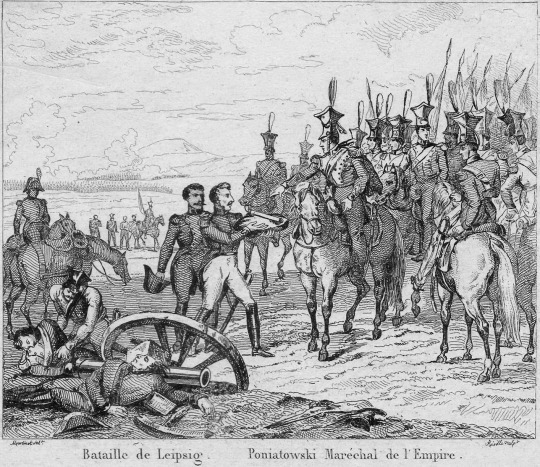
Prince Józef Poniatowski receives the marshal baton, French engraving from the XIXth century
How did Poniatowski react to such a promotion? Did he become happy? Or, at least, glad?
No, not at all. (It looks like he felt that this appointment has more with his future attachment to France, than with military achievements.)
So prince Józef continued to call himself a general, sign documents according his old position. Furthermore, in the written explanation that Poniatowski sent to Warsaw it was stated that “if there was not war for Poland, no one would ever see him in uniform”. Which literally meant resignation. (In the very same letter, though, prince Józef announced that before leaving the army he had to escort Napoleon back to Paris.)
So, dear friends, who was interested in what might have happened with prince Józef had he not been killed at Leipzig - this is the answer. He would definitely retreat with Napoleon to Paris, than resigned and… here the certainty is a little bit less, but something tells me that he would have preferred exile to going back home. But I am not one hundred percent sure.
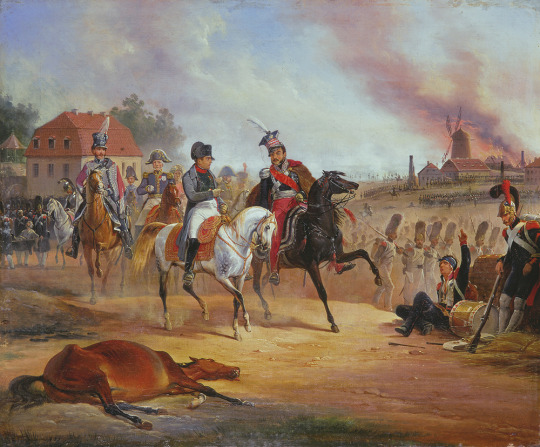
January Suchodolski, Napoleon and Józef Antoni Poniatowski at the Battle of Leipzig
And what about Napoleon? In his memories dictated on St. Helene he wrote that he should have made prince Józef the king of Poland (ha-ha, what would he have done if the latter rejected the crown?), regretted not doing this.
But what is, in my opinion, more interesting, is to learn what the ex-emperor thought on other Poniatowski-related topics? Did he regret blaming prince Józef for Jerome’s mistakes? Had he doubts on not listening the Polish commander’s pleas to take back former Polish land instead of going to Moscow?
Alas, I am afraid, this is a thing we’ll never know…
#józef poniatowski#napoleon#poniatowski#poniatowski and napoleon#charles maurice de talleyrand périgord
56 notes
·
View notes
Text
Contents of my blog (mainly devoted to prince Józef Poniatowski)
Some posts are re-blogs of my friends’ ones, for them the authors are given in brackets.

(The images added just to draw attention)
Portraits:
On paintings as a child
Painted during his lifetime
The most known posthumous (and its copies)
Other posthumous portraits
19th century “Photoshops”
Sculptures
Not looking like himself:
Engravings etc
With blue eyes
Family album:
Parents and sister
Grandparents, uncles and cousins
Some maternal relatives
Photoshops:
Napoleonic Christmas
Ofelia (by duc_du_orleans from Insta)
Riding naked on the streets of Warsaw
Women trying to seduce him
Relationships:
With women:
Karolina von Thun, Zelia Sitańska, Henriette de Vauban and Zofia Czosnoswka (first love, two mothers of his two sons and a French mistress older than him)
Julia Potocka, Rozalia Lubomirska, Barbara Kossowska (three ladies who tried to seduce him)
Princess Augusta of Saxony (a would-be bride that didn’t happen)
Pauline Bonaparte, Maria of Württemberg, Zofia Zamoyska (women with whom he might have had a kind of “romance”)
Queen Louise of Prussia, Anetka Potocka and the rest (of the names ever mentioned)
Why Poniatowski never married
Poniatowski’s children and descendants
With men:
Napoleon
Murat
Davout (a post of @histoireettralala)
Ligne, Schwarzenberg, Sanguszko, Linowski, Szumlański, Fiszer, Morand, Bignon (pals and comrades)
The Czartoryski family, Talleyrand
Dąbrowski, Zajączek, Sokolnicki, Jérôme Bonaparte (“frenemies”)
Prince Józef’s strong and weak points, quotes etc (a little bit about his personality)
His attitude towards becoming a king
A little bit on the topic of prince Józef’s height
Poniatowski’s favorite horse
Life events:
Place of birth, Vienna
Šabac, 1788
Zieleńce, 1792
Raszyn, 1809
Narrow escape from the British Navy when visiting Gdańsk, 1810
Galician campaign, 1809
Smolensk, 1812
———
Prince Józef’s last year:
Crossing the Berezina river, November 1812
Soldiers’ visit to the Copper-roofed palace, December 1812
Leaving Warsaw for good, February 1813
In Kraków, March-April-beginning of May 1813
Last evening in Kraków, May 1813
Entering Saxony, June 1813
Last summer and September, 1813
The battle of Leipzig, 16th-19th of October, 1813
———
Prince Poniatowski’s death in art
———
How Prince Józef’s body was found, 24th of October, 1813
Literature:
Fiction:
A manga by Riyoko Ikeda (a post by @tairin)
Poetry:
Poetry on the topic of his death
A short story on the topic about events behind his death (mine)
Depiction in movies and on stage:
“The uhlan of prince Joseph”, “The Ashes”, “Prince Józef Poniatowski” and “V.I.P”
Napoleon-Walewska related movies
“The Polish Thermopylae“ (a play)
Documentary videos on YouTube
——————————————————————
Books, magazines and other stuff related to Napoleonic era:
Magazines and some books
Books 1
Books 2
Books 3
Napoleonic era fiction
34 notes
·
View notes
Text
WAŻNI LUDZIE:
Książę Adam Jerzy Czartoryski
gen. Józef Zajączek – namiestnik cara w Królestwo Polskie [KP]
książę Antoni Radziwiłł - pierwszy i jedyny namiestnik Wielkiego Księstwa Poznańskiego [WKP]
Stanisław Wodzicki – prezes senatu Krakowa
Stanisław Staszic - dyrektor wydziału przemysłu w KP
Franciszek Ksawery Drucki-Lubecki – ogarnął Bank Polski i założył Towarzystwo Kredytowe Ziemskie
Konstantyn Romanow – sprawował władzę w KP
Nikołaj Nowosilcow – senator KP
Wincenty i Bonawentura Niemojowscy – KALISZANIE/legalna opozycja
Walerian Łukasiński - Towarzystwo Patriotyczne i Wolnomularstwo Narodowe
Piotr Wysocki - Sprzysiężenie Podchorążych
DYKTATORZY Powstania lis.
Józef Chłopicki
Michał Radziwiłł
Jan Skrzynecki
Henryk Dembiński
Kazimierz Małachowski
Jan Krukowiecki
Maciej Rybiński
Wiktor Heltman - Towarzystwo Demokratyczne Polskie
Tadeusz Krępowiecki – Gromady Ludu Polskiego
Ludwik Mierosławski - TDP
Eduard Flottwell - nadprezydent w Wielkim Księstwie Poznańskim
Gustaw Potworowski – powołał „Kasyno”
Karol Marcinkowski - „Towarzystwo Naukowej Pomocy”
Hipolit Cegielski – sukces w przemyśle
Dezydery Chłapowski – dziedzina rolnictwa, nowoczesne uprawy, kursy i praktyki
Jan Koźmian – stworzenie terminu „praca organiczna”
Walenty Stefański - Związek Plebejuszy
Jakub Szela – przywódca rabacji galicyjskiej
Władcy Rosji: Aleksander I → Mikołaj I → Aleksander II
Władcy Prus: Fryderyk Wilhelm III → Fryderyk Wilhelm IV → Wilhelm I
Władcy Austrii: Franciszek I → Ferdynand I → Franciszek Józef I
hrabia Franciszek Stadion – gubernator Galicji
Hryhoryj Jachymowycz - Główna Rada Ruska
Edward Jurgens – millenerzy, praca organiczna w KP
Leopold Kronberg - reprezentant samorządu warszawskiego
Aleksander Wielopolski – głosiciel odrzuconej przez oba nurty ugody polsko-rosyjskiej/ debil
Dyktatorzy powstania sty.
Ludwik Mierosławskie – po jego dyktaturze „biali” dołączyli do powstania
Marian Langiewicz
Karol Majewski „biały”
Romuald Traugutt
Aleksander Waszkowski
0 notes